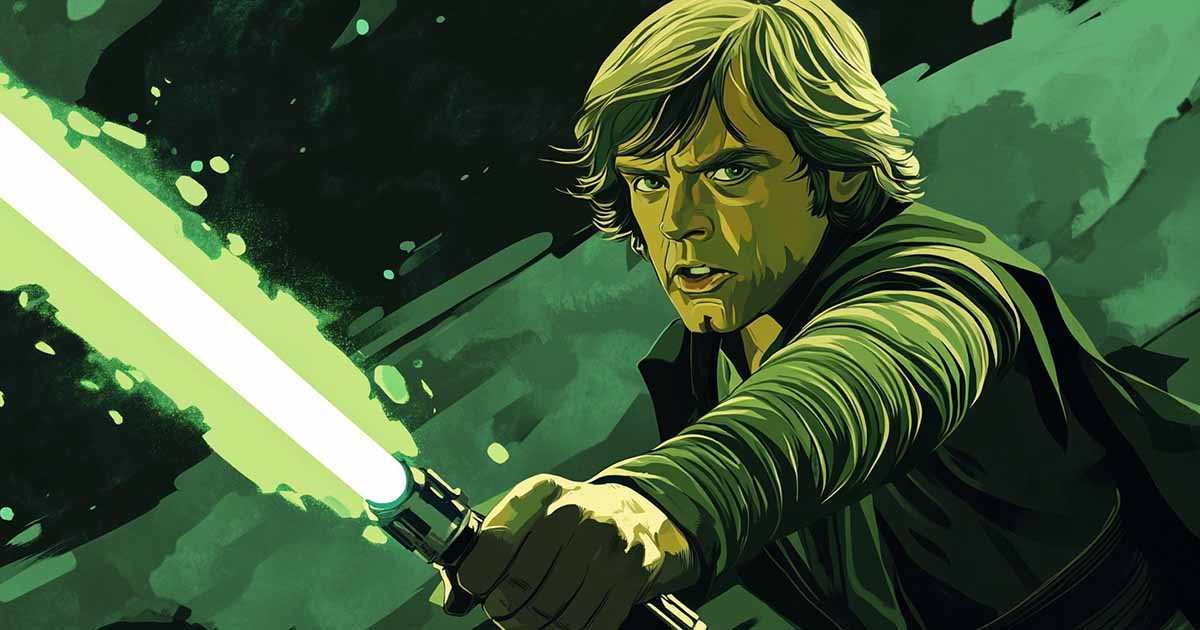Luke Skywalker is an Icon of Traditional American Men
An essay on what makes for a good, traditional fictional character. Luke Skywalker from the original Star Wars trilogy did this, showing science fiction fans how to grow as a man.

The Star Wars saga has captivated audiences for decades, offering a compelling blend of science fiction, fantasy, and timeless themes of good versus evil, heroism, and redemption.
The series is at its best in the original trilogy. And it is the most effective and the most fun when characters like Luke Skywalker closely follow traditional archetypes —those universal patterns or models that represent common human experiences, symbols, and stories across cultures and time periods.
The Heroic Archetype
It is much easier to connect with and like fictional characters rooted in historical and cultural ideals. In the case of the male heroic archetype, these ideals include courage, strength, honor, responsibility, leadership, and a commitment to providing for and protecting others.
In the original Star Wars tales, Luke Skywalker embodied these virtues, exemplifying many aspects of traditional American masculinity.
Courage and Initiative
The Luke Skywalker fans love exhibits a yearning for adventure and a desire to escape his mundane life on Tatooine. This yearning translates into courageous action when he joins the Rebel Alliance and confronts the oppressive Galactic Empire.
His bravery is evident in his participation in the attack on the Death Star, a pivotal moment where he demonstrates his willingness to risk his life for a greater cause.
Luke Skywalker's willingness to risk his own life for things he deems more significant aligns with traditional notions of masculinity that emphasize courage and taking initiative in the face of adversity.
Luke's famous declaration, "I want to learn the ways of the Force and become a Jedi like my father," (Star Wars: Episode IV - A New Hope), reflects his proactive pursuit of a challenging and noble path.
Responsibility and Sacrifice
As Luke progresses, he develops a growing sense of responsibility for the galaxy's fate. He recognizes that his actions have significant consequences and that he must be willing to sacrifice his own safety for the greater good.
His sense of responsibility and self-sacrifice is particularly evident in his confrontation with Darth Vader, where he resists the temptation of the dark side, even when offered power and the chance to avenge his loved ones. Instead, Luke gladly assumes his sacrificial responsibilities and puts the needs of others before his own.
Leadership and Protection
Throughout the trilogy, Luke becomes a leader, inspiring others to fight for freedom and justice. He becomes a symbol of hope for the Rebel Alliance, rallying those around him to oppose the tyranny of the Empire.
His leadership extends to mentoring others, such as Leia and his eventual students, passing on the values of courage, selflessness, and the Force that he has learned, highlighting Luke's role in safeguarding the galaxy and guiding others towards a better future. Luke's actions emphasize the idea that men are protectors and providers.
Heroism and Humanity in the Star Wars Universe
Luke's character arc provides valuable insights into the concepts of heroism and humanity within the Star Wars universe. His journey transcends a simple dichotomy of good versus evil by exploring the complexities of human nature.
Skywalker grapples with temptation, doubt, and the internal struggle between light and darkness, mirroring the broader conflict that pervades the galaxy.
Luke's struggle reflects the universal battle between good and evil that exists within all individuals and throughout the Star Wars universe.
Furthermore, Luke's ultimate victory over the Emperor hinges on his choice to reject violence and embrace compassion, which is perhaps the ultimate example of manliness.

